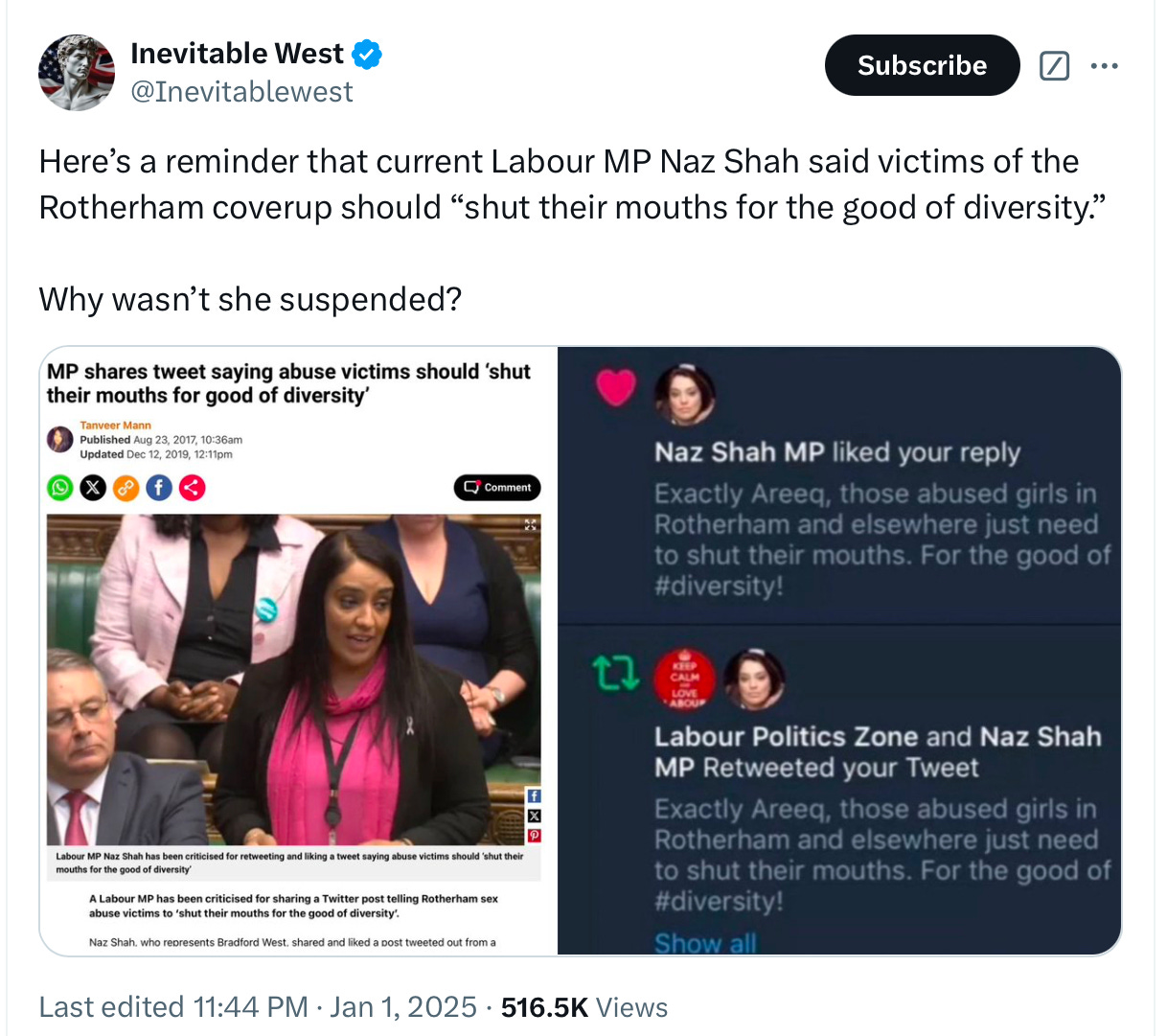The strange dance of progressive course correction
Avoiding premature dissent and why bait-and-switch is endemic to progressive politics.
A notable feature of contemporary progressive politics is the recurrent refusal to debate with—or often even to watch or read—those who disagree with progressive politics. The claim is regularly made that to appear on the same forum with such folk facilitates oppression, that it legitimates those who enable oppression.
This reflects the notion that progressives—due to their profound moral purpose—own morality, that they set the limits of the morally acceptable. That the moral claims of progressive politics are so overwhelming, and that their Theory-based understanding of social and historical dynamics is so profound, that any dissent must be stupid, ignorant or evil. That such views are outside the bounds of the morally acceptable.

This is straightforward moral narcissism. The notion that one confers legitimacy by one deigning to cognitively interact with another is incredibly narcissistic. It is shaming and shunning behaviour done on the basis that progressives set—and should police—the boundary of the morally acceptable. That to interact positively with those outside those boundaries is to enter the realm of toxic moral pollution.
This notion of some profound progressive dominance in moral concern is self-regarding nonsense. Research finds that in reality:
liberals1 and conservatives differ not in the total amount of moral regard per se but rather they differ in their patterns of how they distribute their moral regard.
To be a progressive is not to be some morally superior form of Homo sapien.
It is also a pathologically disastrous information strategy. For who is most likely to spot problems with what you are doing? Someone who disagrees with you. Cutting yourself off from engaging with those who disagree is destroying crucial feedback. Which greatly increases the chance that one will engage in policies deeply antipathetic to human flourishing—as the entire history of Communism demonstrates. Though the contemporary West also provides plenty of examples.
When progressives are in power in the full Party-state version, they are able to suppress alternative views from being publicly expressed. As their Theory is self-evidently correct, that leaves them with only one reason why their—clearly correct—policies are not having the intended consequences: sabotage. Josef Stalin, in his remarks at the 1923 Party Congress, expresses this view quite clearly:
The policy is correct, the driver is excellent, and the type of car is good, it is a Soviet car, but some of the parts of the state car, i.e., some of the officials in the state apparatus, are bad, they are not our men. That is why the car does not run properly and, on the whole, we get a distortion of the correct political line. We get not implementation but distortion. The state apparatus, I repeat, is of the right type, but its component parts are still alien to us, bureaucratic, half tsarist-bourgeois. We want to have a state apparatus that will be a means of serving the mass of the people, but some persons in this state apparatus want to convert it into a source of gain for themselves. That is why the apparatus as a whole is not working properly. If we fail to repair it, the correct political line by itself will not carry us very far; it will be distorted, and there will be a rupture between the working class and the peasantry. We shall have a situation in which, although we shall be at the steering wheel, the car will not obey. There will be a crash. These are the ideas Comrade Lenin elaborated as far back as a year ago, and which only this year he formulated in a harmonious system in the proposal to reorganise the Central Control Commission and the Workers' and Peasants' Inspection in such a way that the reorganised inspection apparatus should be transformed into a device for re-arranging all the parts of the car, for replacing the old useless parts with new ones, which must be done if we really want the car to go in the right direction.
Hence the pattern we can see in our own time, of progressives doubling down on policies and politics that are not working. Their very sense of themselves is of the Moral People Who Know, who have The Correct Theory, so the problem must be elsewhere—toxic fans, perhaps, or deplorable voters. Their politics is based on the splendid vision of the future in their head which—as there is no information from the future and it is a thing of imagination—can be oh-so perfect without any reality-testing.
But there are people who do not share their noble Vision. Either because they are actively hostile—therefore are either oppressors, or complicit in oppression—or because they do not yet have the correct Understanding. Efforts thus have to be redoubled to identify, silence, sack or whatever the former and successfully inculcate correct Understanding to the latter. In Party-states, that leads to not only tyrannical, but murderous, politics.
While various mechanisms to subvert, block, or circumvent democratic accountability are well advanced in the contemporary West, nevertheless, there remain lots of mechanisms for pushback. When a particular narrative, or policy, becomes increasingly untenable, course correction is required.
One way for such course correction is the policy or narrative just gets quietly dropped. It essentially gets passively memory-holed.
Another way is well-timed dissent triggering a shift. The dissent has to be by someone acceptably progressive. That is, someone inside the political magic circle. Only people within the progressive magic circle—so the folk who own morality—can have the moral legitimacy of being listened to by progressives.
This dissent must not, however, be premature. It cannot be before a critical mass of progressives is willing to change course.
If someone engages in premature dissent, they will either be memory-holed—be given the silent treatment—or they will become coded as “right wing”. In the US, going on Fox News is a classic way to be coded as “right wing” because one is associating with the morally toxic. By going on Fox News, one is implying such folk have moral legitimacy, when only progressives possess moral legitimacy.
Examples of those who engaged in premature dissent are historians Mark Lilla and Thomas Frank. Mark Lilla has a well-established record of being very perceptive about what might be called the logic of political belief. His books on the same are well-worth reading.
Unfortunately for his standing in progressive circles, he was too perceptive. He worked out the problems with identity politics and was unfortunate enough to express that far too soon. He received the silent treatment. Thomas Frank found himself in the same boat.
Conversely, political scientist Yascha Mounk was able to delay his dissent on identity politics until it was much more acceptable.
A similar example is econ-blogger Noah Smith. He has various potential black marks—serious economist (so understands trade-offs), patriotic, Jewish, male, not a person of colour. Nevertheless he is a progressive in good standing with folk such as fellow economists Brad DeLong and Paul Krugman. So, after Trump’s clear win in the November 2024 US Presidential election, he was able to let loose on what nonsense land acknowledgements are.
It possibly helped that Trump might have received a majority of the Amerindian vote (or possibly not). This was the report from an early exit poll, which at least dented their standing as a marginalised group.
Humour can also work. Jon Stewart has managed to do that—over the Lab Leak hypothesis, for example.
So, there are ways in which progressives can course correct. Such mechanisms only work, however, if they do not offend too strongly against the moral narcissism of progressives.
Bait and Switch
None of this means that progressive politics converges towards a more ecumenical form of politics as anything other than a temporary lull. Instead, it moves on to the next manifestation of the underlying vision.
Bait-and-switch is an endemic pattern in progressive politics. The history of Communism provides various dramatic examples. For instance, re-distributing land to the peasants when the power of the Party over the state is being consolidated. Once the Party-state is firmly established, the land is then “collectivised”—that is, taken from the peasants and turned into Party-state controlled units.
A famous example of bait-and-switch is the Hundred Flowers campaign in the People’s Republic of China, allowing freedom of speech, followed by the Anti-Rightist campaign, viciously enforcing conformity. A rather slower-motion example of that was New Left radicals supporting “free speech” campaigns on campuses in the 1960s. As progressive domination of academe progressed, that increasingly became speech codes and then full-blown DEI conformity, public-private partnerships to enforce online censorship and anti dis/mis/mal-information campaigns.
Censorship is always the weapon of a dominant regime, never of insurgents. Folk generally do not want censors to be folk with very different views to themselves.
Feminism and anti-racism both provide similar baits-and-switch. We are told it is all about equality between the sexes and races, that any preferences are just temporary, and then we find such preferences expand over the decades. That, for example, 50 years of “empowering women” is not enough, there is ever more that needs to be done.
A further example is provided by Lenin and Stalin’s nationality policy—including the original version of DEI, Stalin’s Korenizatsiya program. National identity was allowed to flourish—in suitably socialist form—until it got in the way. The program was then abolished and national identities—particularly Ukrainian national identity—were brutally repressed.
Mao and Kim il Sung learnt from Stalin’s failures and instituted their own versions. Creating a moral caste system is endemic to oppressor/oppressed templates, as we can see with intersectionality: which morally grades people by what level of privilege their category—i.e., their intersectional moral caste—is deemed to have.
What, did you think DEI officers acting like commissars or political officers was some sort of weird coincidence? It is a structural necessity for this sort of program, that is precisely the appeal. Especially given that people can lose their caste status by breaking various opinion-taboos, for error has no rights and DEI officers, and other progressives in good standing, can determine who is in error. Inquisitors (commissars) are a natural—indeed necessary for full implementation—part of the system.
The fundamental pattern of progressive politics is to insert activists and activism into everything. Anti-discrimination law—by creating a legal-bureaucratic structure of folk who operate on the principle that everyone else is hovering on the edge of wrong-think and wrong-act—creates an excellent path for the same. DEI just represents the latest operational version of that urge to insert activists and activism everywhere, riffing off anti-discrimination laws.
It is striking how pervasive has become the fundamental pattern of progressive politics of inserting activists and activism into everything: into workplaces, schools, universities, professional associations, media, journals, sport, fiction, entertainment, games, hobbies. Once a foothold is there, it will not only never be willingly abandoned, it will be expanded.
The bait-and-switch is so ubiquitous in progressive politics because it is basic to the structure of progressive politics. The underlying vision never goes away, it just gets operationally updated.
So, we get the initial politics of the reasonable aspiration—land to the peasants, freedom of speech, expanding the pool of applicants. That is the bait.
Once that is established, and once progressive institutional power is sufficiently consolidated, then we get the social transformation version that progressive politics defaults to when it can. The version that requires control over what people do and think—including who gets selected for what—so that the vision can be put into practice. The version that is the application of social power. That is the switch.
As progressive politics is the politics of being superior deciders—and as being superior deciders is precisely how bureaucrats, managers and professionals gain power and authority—it is no wonder that our increasingly bureaucratised societies, with an ever-larger professional-managerial class, are also increasingly subject to such politics. The Bolshevik transformation of Russia was above all a revolution of and for the (activist-dominated) bureaucracy. Our societies, increasingly colonised by their welfare state apparats—including non-profits and corporate HR departments—are going down a networked, slow motion, version of building the activist-state.
(The blue-haired DEI scolds of HR are, however, making themselves as hated as were Cromwell’s Major-Generals. A form of hope.)
The bait-and-switch pattern of progressive politics may, or may not, be intentional in any particular instance. The pattern itself is driven by the structure of progressive politics. But we see the same functional duplicity in other aspects of progressive politics.
One is in argument, in the use of the motte-and-bailey argument pattern, the so-called motte-and-bailey fallacy. An expansive claim is made (the bailey). When challenged, it is reformulated as some more banal, more defensible, version (a retreat into the motte). Once the argumentative pressure is off, the more expansive version is once more advanced.
Very much related to this is duplicitous use of language. The well-known pattern of using your vocabulary, but not your dictionary. So, some word is inserted into policy—such as equity—that has a general meaning people assume applies. That is using your vocabulary. But the word also has a much more particular meaning in progressive discourse, which is then used for social and policy leverage once the wording has been accepted—not using your dictionary, but a meaning of their own. This is an endless game, so trying to keep up with such usages is a bit of a thankless task.
We see the same structural duplicity in the use of bait-and-switch strategy; in the motte-and-bailey arguments; in using your vocabulary but not your dictionary. In each case, there is the claim to be motivated by trumping moral purposes, but the refusal to be constrained by actual morality.
Grounding their morality, and their politics, in the imagined future releases them from the constraints of reality-testing. The bait-and-switch strategy represents the move from when they have to get consent, they have to persuade, to when they have the institutional power to not be bound by the petty constraints of consent.
The notion of “toxic fans”, or of “deplorables”, is a notion of moral pollution plus denigration of consent from the “unworthy”. The British elite refusing to be bound by “unworthy” consent over migration is a case in point—including leading to disastrous policy.
Many have apparently also not been much bothered by pesky notions of consent regarding the sexual predations of imported sex pests, while to notice the pattern is to commit the sin of Islamophobia.
Even now, the move of “quick, change the subject” is on display as members of the British media and commentariat have chosen to be outraged over … Elon Musk making a public fuss about industrial level rape and sexual exploitation of often underage girls going back decades. No, folk like them—folk who own morality—are the ones who should determine what matters and when, what is the approved Current Thing, should set and control the approved public narratives.
Clearly, much of the appeal of progressivism is the sense of absolutely dominating moral claims, while seeking to avoid any inconvenient constraints, all while gaining increased social leverage by controlling legitimacy as collective owners of morality. This is the politics of moral narcissism.
Moreover, these patterns do not depend on some particular doctrine or set of doctrines. They flow directly from the structure of progressivism, from the politics of the worship of the future.
So, yes, there is the strange dance of progressive updating. For the underlying vision—and its bait-and-switch politics of moral purpose without moral constraint—never goes away.
References
Amory Gethin, Clara Mart´inez-Toledana, Thomas Piketty, ‘Brahmin Left Versus Merchant Right: Changing Political Cleavages In 21 Western Democracies, 1948–2020,’ The Quarterly Journal Of Economics, Vol. 137, 2022, Issue 1, 1-48. https://academic.oup.com/qje/article/137/1/1/6383014
Mark Lilla, The Stillborn God: Religion, Politics and the Modern West, Alfred A Knopf, 2007.
Mark Lilla, The Shipwrecked Mind: On Political Reaction, NY Review of Books Imprint, 2016.
Andrew M. Lobaczewski, Political Ponerology: A Science on the Nature of Evil Adjusted for Political Purposes, Red Pill Press, [2006] 2012.
Peter McLoughlin, Easy Meat: Inside Britain’s Grooming Gang Scandal, New English Review Press, 2016.
Thomas Sowell, A Conflict of Visions: Ideological Origins of Political Struggles, Quill William Morrow, 1987.
Adam Waytz, Ravi Iyer, Liane Young, Jonathan Haidt & Jesse Graham, ‘Ideological differences in the expanse of the moral circle,’ Nature Communications, (2019)10:4389. https://www.nature.com/articles/s41467-019-12227-0
The studies discussed in the paper offered the term progressive for non-US participants.







So basically the core problem with progressivism is that the future eventually turns into the past.
The purported morality of the Left is a morality of expressed attitudes, not a morality of virtuous behavior. Moral approval for expressed attitudes without the need for any substantive moral behavior is ideal for the moral narcissist.